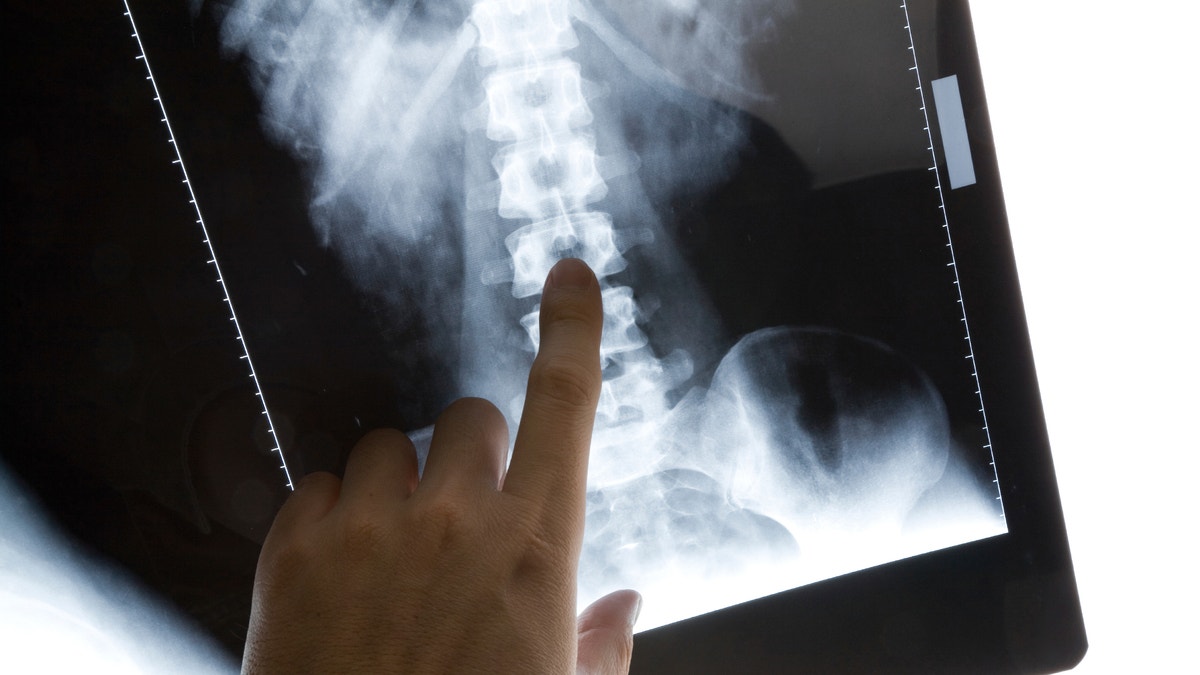
body x-ray photo for background (iStock)
Most patients lack basic knowledge about the risks of radiation exposure from X-rays and other diagnostic imaging tests used to detect cancer, a recent study suggests.
Researchers analyzed survey data from more than 5,400 people who had diagnostic imaging at a comprehensive cancer center to see how much these patients knew about ionizing radiation, a type of energy that is strong enough to penetrate the body and help create images of internal organs.
"Our concern is that the term 'radiation' may have a negative bias," said lead study author Dr. Joseph Steele of the University of Texas MD Anderson Cancer Center in Houston.
"Essentially, that irrational fear may result in patients not agreeing to something that is in their best interest," Steele added by email.
Energy emitted from a source is generally referred to as radiation, whether it's heat or light from the sun, microwaves from an oven, X-rays from an X-ray tube, or gamma rays from radioactive elements, according to the World Health Organization.
Overall, only about 22 percent of the survey respondents could correctly define ionizing radiation as a type of energy, Steele and colleagues report in the Journal of the American College of Radiology.
Patients were also confused about what types of tests use ionizing radiation.
Only about 35 percent of them correctly said computerized tomography (CT) scans used ionizing radiation, while roughly 29 percent incorrectly stated that magnetic resonance imaging (MRI) tests used ionizing radiation.
Among patients who claimed to have some knowledge of ionizing radiation, about 57 percent knew their abdominal CT used ionizing radiation, while nearly half of MRI recipients incorrectly thought this test used ionizing radiation.
Many survey respondents also didn't understand risks from diagnostic doses of radiation.
The researchers asked patients several questions about risks associated with CT scans of the abdomen and pelvis, for example.
Among patients who thought there were risks from these CT scans, about 24 percent thought they posed a risk of sterility, and around 12 percent thought there was a risk of either acute radiation sickness or passing genetic mutations to their offspring. In reality, CT scans of the abdomen and pelvis don't carry any of these risks, the authors write.
One limitation of the study is that it was done at a single cancer center, and knowledge might be different among patients treated elsewhere, the authors note. The survey also had a low response rate of about 11 percent, though this level of participation is typical for online surveys, the authors said.
It's possible that at least some of patients' lack of knowledge in the study may be due to people simply relying on their doctors to recommended needed tests and failing to ask about potential risks, said Dr. Leonard Berlin, a radiology researcher at Rush University and the University of Illinois in Chicago.
"It's extremely rare to encounter a patient who asks, 'Doctor, can the exam harm me in any way?'" Berlin, who wasn't involved in the study, said by email.
"Indeed, it's rare for them to even ask how much the exam will cost," Berlin added.
Repeated exposure to ionizing radiation should also prompt patients to ask questions about the risks, said Dr. Hans-David Hartwig, a researcher at Wolfson Children's Hospital in Jacksonville, Florida, who wasn't involved in the study.
"Excessive exposure can cause damage to our body's cells and DNA," Hartwig said by email. "We use it for certain diagnostic imaging as it gives clear pictures of problems, aids in correct diagnosis, and is time efficient - i.e. if you have a bleed on your brain you do not want to be in an MRI scanner for 30 minutes."
